Drive Digital Transformation in Healthcare with a Quality Management Information System

Introduction
As technology innovation continues to rapidly advance, digital transformation in healthcare is becoming significantly more important. This shift is allowing providers of care to reimagine how healthcare is delivered, managed, and experienced. At the heart of this transformation is the integration of Quality Management Information Systems (QMIS), a crucial software solution that drives health and social care providers towards improved patient outcomes, enhanced efficiency, and continuous quality improvement.
As healthcare providers and organisations manage the challenges of an increasingly complex healthcare landscape, the integration of a QMIS becomes a strategic imperative and must form a crucial part of the organisation’s digital transformation strategy. In HIQA’s recent Overview Report of Monitoring and Regulation of Healthcare Services between 2021 and 2023, HIQA highlighted areas for improvement in the collection of complaints at ward level, the management and tracking of incidents, the effectiveness of audits and quality improvement planning (QIP). The report also noted that the oversight and attendance at education and training was an area that required improvement in all hospitals. Many of these areas for improvement can be addressed by implementing a comprehensive QMIS.
In this blog, we delve into the pivotal role of a QMIS in driving digital transformation in healthcare, and outline how HCI KnowledgeTM is helping healthcare providers maximise the benefit of their QMIS to meet regulatory requirements and improve patient safety.
The Role of QMIS in Driving Digital Transformation in Healthcare
1. Enhancing Patient Care:
A Quality Management Information System plays an integral role in the delivery of safe, effective patient care. A QMIS will provide instant access to comprehensive, best practice policies, procedures, protocols and guidelines (PPPGs). Having easy access to this key information, means healthcare professionals can make informed, timely decisions, resulting in enhanced patient care. The QMIS also facilitates seamless information sharing among various medical professionals, fostering a culture of collaboration and well-coordinated patient care.
2. Streamlining Operations:
The complex nature of healthcare operations demands efficient quality management systems. A QMIS simplifies and automates various quality processes, from document control, risk management, incident management, internal auditing and management of training records and events. Having a user-friendly system such as HCI KnowledgeTM, not only increases the front-line staffs’ interaction and utilisation of the QMIS, but it also reduces the administrative burden on healthcare professionals in managing their quality and safety data for regulatory compliance purposes. As a result, healthcare organisations can allocate resources more effectively, leading to increased operational efficiency.
3. Ensuring Regulatory Compliance:
Compliance with regulatory standards is paramount in the healthcare industry. A QMIS provides a robust framework for maintaining compliance, particularly around policies and procedures and mandatory training requirements. For example, a QMIS allows you to demonstrate effective management of documents throughout the document lifecycle, and the acknowledgement functionality allows you to demonstrate that the documents have been distributed and communicated to staff.
A QMIS can also support your training strategy, helping you to ensure that mandatory training is completed and that the records and data around training compliance are easily accessible during regulatory inspections. In HIQA’s Overview Report of Monitoring and Regulation of Healthcare Services between 2021 and 2023, they highlighted that oversight and attendance at education and training was an area in need of improvement in all hospitals.
4. Data Security and Privacy:
With the increasing digitisation of healthcare records, the importance of data security cannot be overstated. A QMIS incorporates robust security measures to safeguard sensitive information. By ensuring the confidentiality and integrity of sensitive data, healthcare organisations can build trust among stakeholders and comply with data protection regulations.
5. Continuous Improvement and Analytics:
A QMIS provides valuable insights through analytics and reporting tools. Healthcare organisations can analyse data from documents, internal audits, incidents, complaints, and risks, in order to identify trends, and implement data-driven improvements. This culture of continuous improvement is essential for adapting to evolving healthcare needs and staying ahead in a dynamic and ever-evolving industry.
HCI KnowledgeTM – Maximising your Quality Management Information System
HCI has been implementing Quality Management Information Systems (QMIS) in health and social care organisations for almost two decades. During this time, we have listened and responded to the needs of our clients and developed HCI KnowledgeTM.
HCI KnowledgeTM is a customised, online interface that enhances the front-line users’ experience and interaction with the QMIS, whilst also reducing the administrative burden of regulatory compliance.
The systems within HCI KnowledgeTM are:
- PPG LibraryTM – Policies, Procedures and Guidelines Portal
- QualSIPTM – Quality and Safety Intelligence Portal
- TrainScanTM – Training Attendance and Analysis Portal
- Occurrence Reporting Portal
- Risk Register Portal
These systems are transforming how our clients utilise and interact with their QMIS. For example, the PPG LibraryTM enables easy access to policies and procedures and guidelines held within the QMIS. It removes the barriers to accessing policies and procedures and improves staff interaction and utilisation of the QMIS. Staff have the ability to search for documents, view documents and acknowledge documents, without having to log into another system. The PPG LibraryTM is mobile enabled, so a mobile workforce can access policies, procedures, and guidelines from wherever they are, from a mobile device or a tablet.
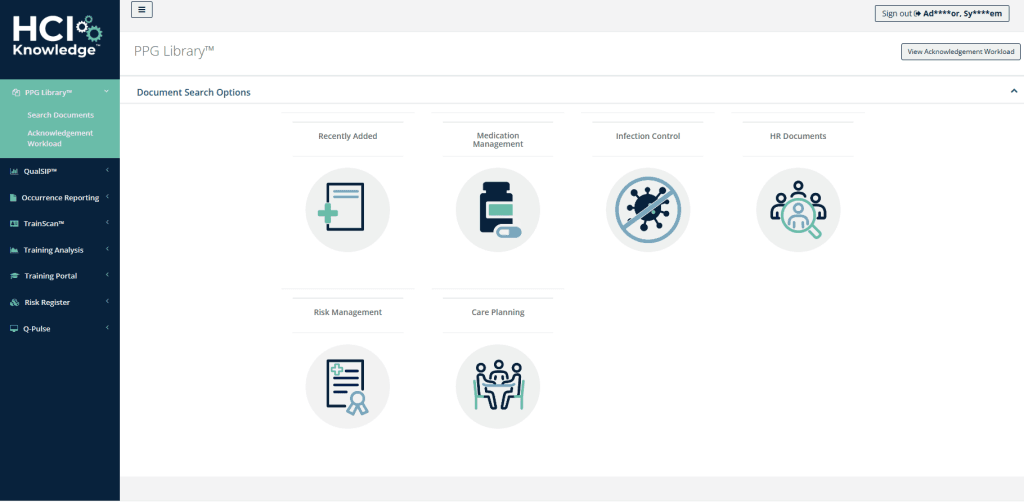
HCI developed TrainScanTM in response to a client’s need to streamline the management of mandatory training requirements for a large hospital. TrainScanTM is an intuitive system, that allows for easy recording of staff attendance at training events by scanning their staff I.D. badge. Line Managers and Training Managers can quickly analyse all training activities undertaken by staff within their organisation or department. Staff also have the ability to manage their own training record, view their training history and book themselves onto a training course.
TrainScanTM is a valuable tool to have during a regulatory inspection as it provides quick access to real time training data across multiple departments. This allows you to quickly demonstrate oversight of mandatory training compliance.
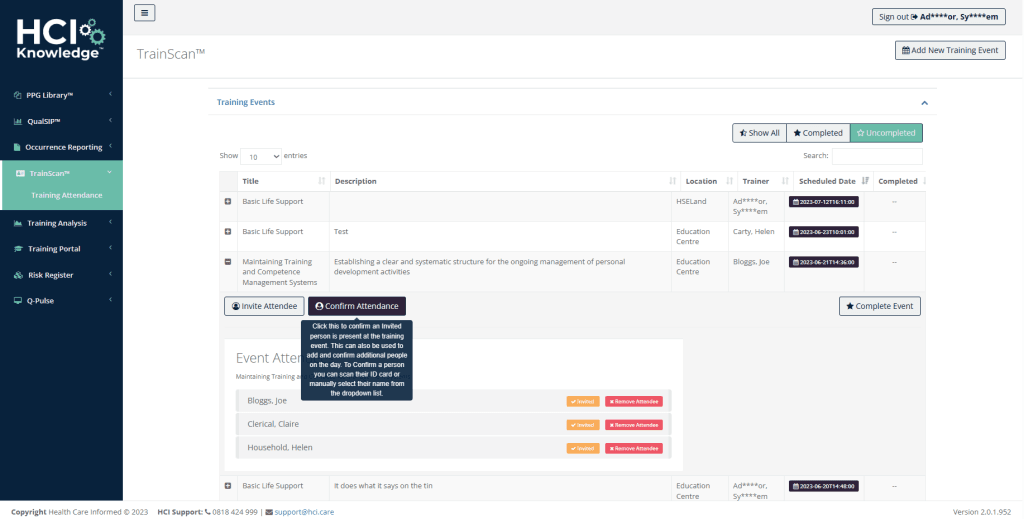
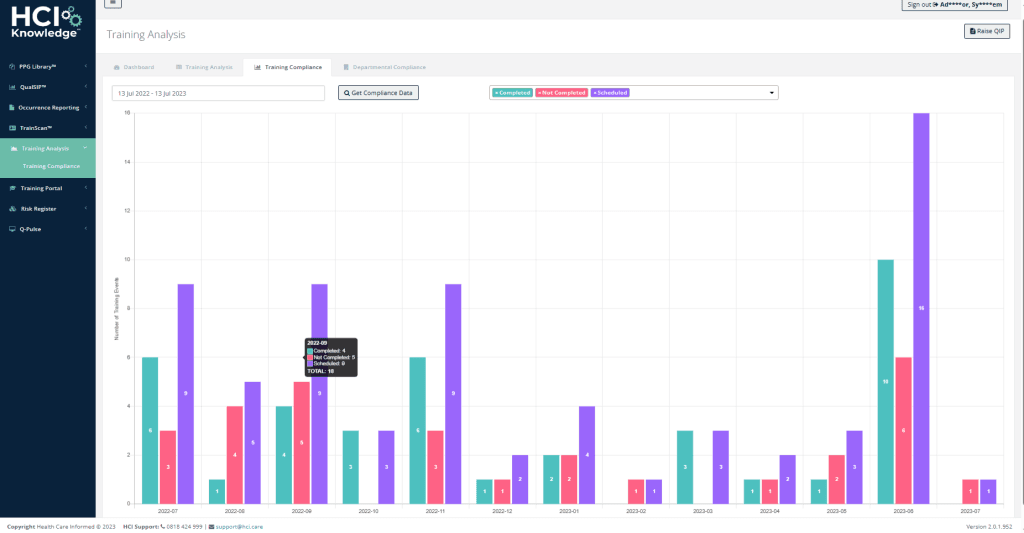
HCI’s Occurrence Reporting system is an online portal that allows your staff to easily report any incident, risk, complaint, feedback or learning, through dynamic reporting forms. The forms are customisable to your requirements and can reflect mandatory reporting requirements.
All completed forms are uploaded automatically to the QMIS and the appropriate person is notified via an email alert. Oversight and data analysis of incidents, risks and complaints can be demonstrated in QualSIPTM.
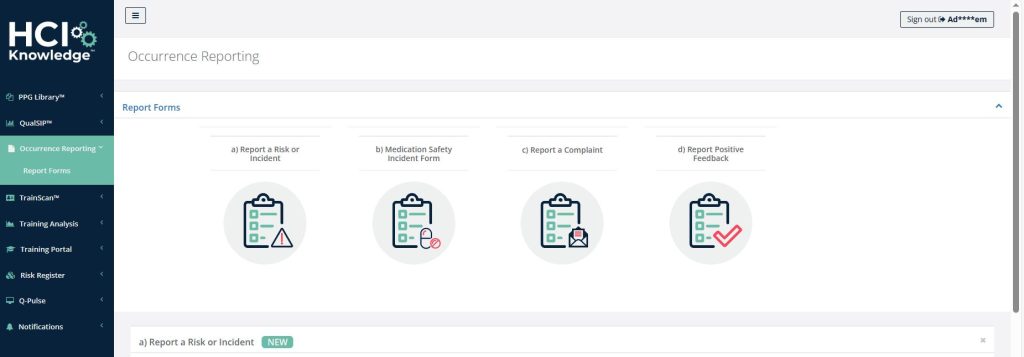
QualSIPTM provides Senior Management with access to real time analysis of quality and safety data held within the QMIS. Data is presented in dynamic dashboards and graphs for incidents, complaints, risks, audits and document control. Managers can filter the data by department, timeframe, type, risk rating etc. and can drill down into the individual data components and action as required.
Analysing this critical data allows for risk areas or trends to be identified, which informs timely decision making. QualSIP also acts as a Governance tool that allows you to demonstrate to inspectors that you have centralised oversight of your QSMS.
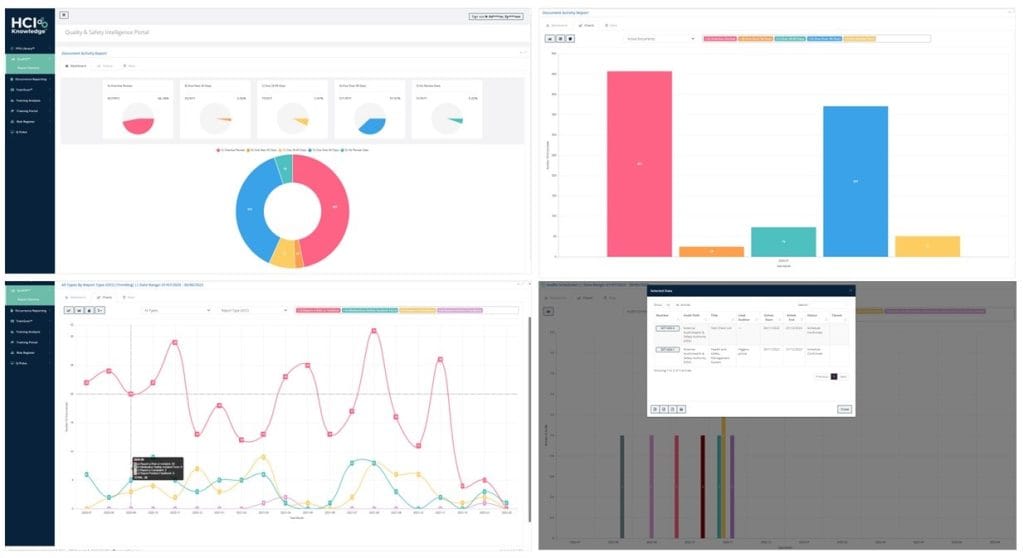
Conclusion
In conclusion, the integration of Quality Management Information Systems is indispensable for the successful digital transformation of the healthcare sector. From enhancing patient care to streamlining operations and ensuring regulatory compliance, the QMIS plays a pivotal role in driving efficiency, patient safety, and quality improvement. As healthcare continues to embrace technology, organisations that invest in robust QMIS solutions will not only meet the challenges of the digital age but also help provide higher quality care to their patients.
At HCI we help providers of health and social care make intelligence driven decisions to attain, manage and improve quality, safety and regulatory compliance. Our digital health transformation specialists have been implementing Quality Management Information Systems in health and social care organisations for almost two decades. We also provide ongoing maintenance, administration and support of our clients’ systems to ensure that they are maintained in line with best practice, and that users have continuous access to knowledgeable support. With our support you can have confidence that you are embedding a best practice QMIS within your organisation that will transform your quality and safety processes and support regulatory compliance.
For more information on HCI’s Digital Health Transformation Products and Services contact HCI at 01 629 2559 or info@hci.care.